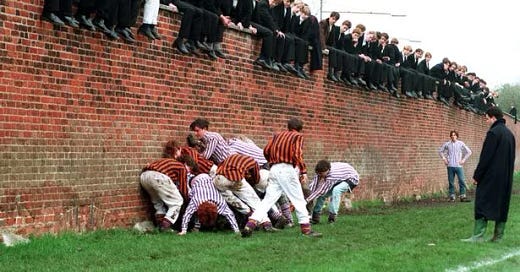The Danish Secret
This is unusual. I am about to write about education. I don’t think I have ever done that before, primarily because when someone tries to explain to me the difference, say, between the different types of Danish sixth form, which are called things like STX, HHF or HPV, or how the Danish -3-to-+12 grading system compares to the older, similarly batshit crazy way they did things, I start thinking about lunch.
But there is one special feature of the Danish education system which I find genuinely fascinating, indeed I think it is of global relevance, to the point that I have become a kind of glassy-eyed evangelist telling everyone I meet outside of Denmark all about it, and why their country ought to adopt it (and some are!).
The trouble is, this particular Danish innovation seems to be under threat… from none other than the Ministry of Education.
My own education was awful. Have you seen any of the Mad Max films? It was like that. Perhaps because of this, and maybe also the communal singing at the beginning of parent-teacher evenings here, I was reluctant to get involved in my own children’s Danish schooling, and managed to avoid most of it.
But then, one day, as my eldest child approach the end of his 9th class, I overheard him talking to my wife about some strange kind of ‘extra’ year of school.
‘An extra year of school? Voluntarily?’ I thought. How odd.
What’s more, they were talking about a boarding school. Again, from an English perspective, this was not an appealing prospect, but it turned out that this was a boarding school where 16 year olds could focus on their favourite activity - be it musical, sporting, cultural, scientific, E-sports, or whatever* with a little academic stuff on the side.
This was something called efterskole (literally ‘after school’). It sounded like some kind of utopia, and that is pretty much what it turned out to be. Every adult Dane I have since spoken to who attended efterskole has, without exception, described it as the best year of their life, usually with kind of distant, wistful smile on their face.
The cost was a downside. A year at efterskole is between DKK80-100.000 which is one of the reasons why there are complaints that they are elitist, or have become so. Back in the last century, efterskoler had a different kind of reputation: the balance seems to have tipped towards the middle classes-and-upwards in the 21st century. (I cherish the memory of the most Danish moment of my life when, at a dinner party, I overheard fellow guest complaining that her child had failed to get into his first choice wind surfing efterskole. I think we need something beyond ‘first world problems’ to define that scenario.)
I rang Torben Vind Rasmussen, the formand for efterskoler in Denmark. Is it true efterskoler are now the Danish version of a Swiss finishing school for posh kids? No, said Torben. This was absolutely not the case. Some subjects or schools tended to appeal to the children of higher income families, but there were many other schools with a more balanced demographic. He added that there are currently 32.000 efterskole students - a record number - and around 20% of them are on reduced- or zero fees. That’s actually not a bad proportion.
Of course, Torben conceded, efterskoler could represent Danish society more accurately. That would be great, but that will require more money, plus a concerted effort to attract students from what is euphemistically termed less ‘resource-strong’ families.
Where will the money come from? If I were a member of the communist party, Enhedslisten this would not be a concern, but I try to function in the real world, so I have a few suggestions:
A Swing Door Tax on politicians who leave parliament and jump into related jobs in the private sector. The tax will increase the more powerful a position the politician has held, the more closely related their new job is to their previous one, and the quicker they make the jump after leaving.
I’ve said it before, but what if we cut 50 members of the Danish parliament? Would anyone really notice? Would democracy suffer? I very much doubt it.
3) I think that will probably cover it.
I do hope someone high up in the Ministry of Education is taking notes because I hear that the minister Mathias Testfaye, appointed to the job by the ‘children’s prime minister’, wants to abolish efterskoler. How do I know this? Well, he recently told this newspaper ‘We in no way want to close efterskoler.’
That can only mean one thing. He is thinking of closing, or at least ‘reforming’ efterskoler, inspired by the recent educational Reform Commission, written by economists, which seems to have mistaken children for tax-generating automatons to be pushed through the education system as quickly as possible, ideally into the kinds of jobs foreigners are queueing up to come to Denmark to do: plumbers, engineers, mechanics etc. They aren’t allowed to because of the feedback from the Social Democrats’ focus groups, made up of a handful of the floating right-wing voters who are so crucial to them maintaining power. As a result the economists have drawn up some Excel arcs which show that, to fill the gap in the workforce, Danish kids must pull up their socks, put their nose to the grind stone, rush through a (preferably) vocational education, and get to work as soon as possible. I suppose we should be grateful there are no coal mines in Denmark.
But I believe any diminishment of the efterskoler would be a catastrophe. For one thing, who is going to raise our teenagers? Once children reach the age of about 13, the growth of a tiny bone of the inner ear means they are literally unable to hear parental frequencies. And, so, dirty dishes are left on top of the dishwasher. Armpits are left unwashed. Shoes are left strewn across entrance halls. And bedrooms look like Beirut on a bad day.
But something magical happens when you gather a couple of hundred 16 or 17 year olds together for a year: they raise each other. Smelly armpits need only be remarked upon once. Kitchen and cleaning duties are carried out without a murmur of dissent. Teenagers miraculously turn into functioning human adults.
Secondly, efterskole helps prepare young people for the brutal realities of life as an adult in the mid-21st century. Things are moving fast, right? Faster than we have ever known, what with emergence of ChatGPT. Young people need to be agile and flexible, if only to keep up with all the new genders.
Efterskole equips them for that because it shows them new possibilities, and helps them deepen passions for the things they enjoy. And god knows, in the dystopian post-industrial wasteland of the near-future, the tiniest shred of enjoyment will be a precious thing.
And thirdly, efterskole helps to reinforce the great super power of the Danish people: their social cohesion.
A friend of mine helps run a very major Danish educational institution. Lots of foreign students attend this institution, and I love to hear my friend’s observations about the different nationalities and how they interact.
His basic summary is this: the Danish kids perhaps don’t know quite so much stuff as, say, the French or English kids. They haven’t been force fed the collected works of Proust like foie gras geese, or had the Periodic Table beaten into them - but they are damned good at bringing a team together, at leading, at doing all the human stuff that Google and ChatGPT will never be able to do.
In the near future, I predict that every company around the world will need a Dane. When that time comes, a period of study at an efterskole, or indeed a højskole - that other great Danish further education innovation - may well turn out to be this country’s key competitive advantage in the global market.
I later found out somewhere in Denmark there exists a skiing efterskole, which I still can’t quite get my head around - there being no hills here on which to ski.
END





